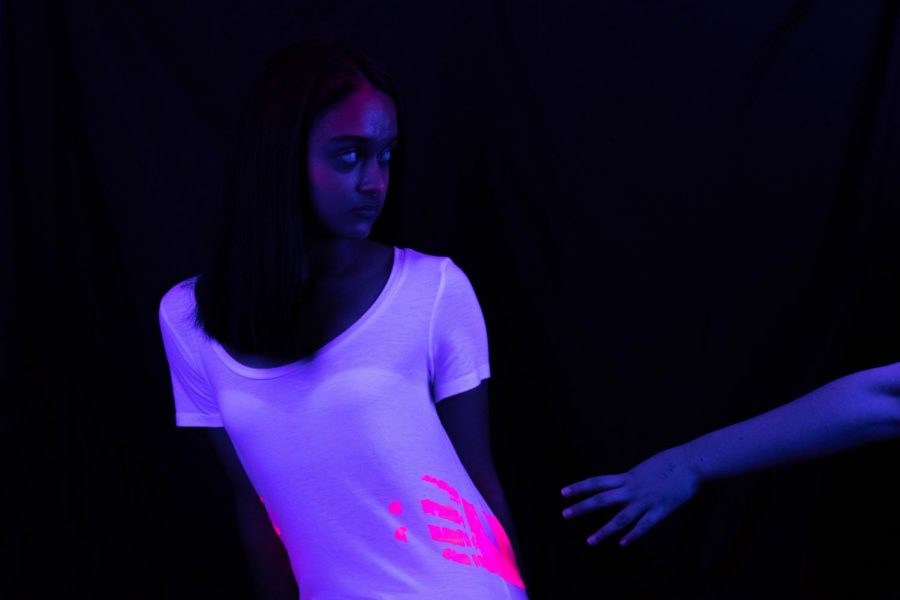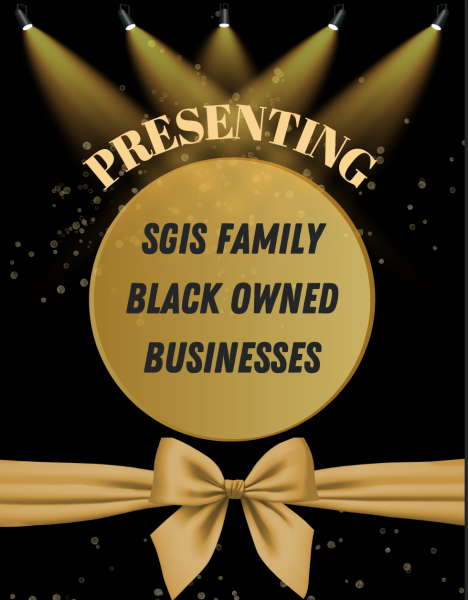#MeToo
Is the movement that brought down some of the world’s most powerful men actually giving us the change we fought for?
Photo: Laura Beard
Senior Surabhi Singh poses to look like someone is trying to touch her. Many students of St. George’s also feel as though people leave their handprints after they have been sexually harassed.
I first became interested in the #MeToo movement walking to a football game last year with my friends and fellow seniors Hannah Grace Howell and Rachel Crane. What should have been a normal Friday night of a few friends going to a football game together quickly turned into something darker.
“I was walking with two of my friends,” Howell remembered. “This car was driving down the road and stopped near the side walk where we were and rolled down the window, and then the guy got out and started approaching us.”
I remembered that the man from the car started following us, continuing to stalk us even after we began sprinting towards safety. Even though this incident occurred over a year ago, all three of us vividly remembers how it made us feel.
“It was very terrifying,” Howell said, “and it might not have been anything, but still the fact that this guy was approaching us, in a way that triggered our gut feeling that something was wrong.”
This terrifying experience led me to start asking questions. Were my friends and I the only one to go through something like this? Or had other people experienced this too?
Whenever I brought up what happened that night with my friends, girls immediately began recounting their own disturbing stories. For instance, alumna Faith Huff met a boy at vacation Bible camp several years ago and started dating him over a few weeks. Then he sexually assaulted her.
“Technically I wasn’t even supposed to be dating this young, 15 year old me,” Huff said. “When he invited me over, I went over, and that’s when the incident took place, and afterwards, I felt awful, I felt dirty, I didn’t even feel like a person to be honest. I felt less than human for a really long time.”
It is stories like these that dominated casual conversation during the rise in popularity of the #MeToo movement. With 81 percent of women having experienced sexual harassment according to NPR, it’s understandable why the movement gained popularity so rapidly.
The movement’s popularity spiked after actress Alyssa Milano used the “metoo” hashtag to ask social media users to share their stories of harassment and assault. According to USA Today, the hashtag has been used over 19 million times since Milano’s tweet. These tweets led to the downfall of 201 powerful men, such as Harvey Weinstein and Kevin Spacey per The New York Times.
Though Milano had not originally realized that she had used the movement’s main motto, she later publicly recognized the movement’s founder Tarana Burke as the creator of the campaign.
According to the movement’s official website, #MeToo was initially founded in 2006 by Tarana Burke to provide resources for women of color from low-income communities who survived sexual violence.
The #MeToo organization reflects the troubling fact that women of color experience rape, physical violence and/or stalking at a higher rate than white women. In addition to having a higher rate of sexual assault, women of color are less likely to report their assault. According to End Rape on Campus, at least 15 black women do not report their rape for every one Black woman who does.
Alumna Lauren Purdy’s belief that black women are often dismissed when they report sexual harassment explains why many decide not to report it when it happens.
“I think for me specifically, not only me being a woman, but also me being an African American, that topics such as sexual harass-ment are often brushed off,” Purdy said. “I’m not saying that doesn’t apply to other women also, but I think especially for black women, they’re often ignored.”
Though the movement was originally founded to help low-in-come women of color, it has since evolved to include all survivors of sexual violence, regardless of class, race or sexual orientation.
The movement aims to support survivors of sexual harassment by providing resources, researching sexual violence and pushing for more protection for survivors in legislation. One of the ways to accomplish this is by encouraging the discussion of sexual violence in society.
Huff reflected on what it would have been like if the #MeToo movement had been as popular as it is now when she was going through the process of healing.
“That would have been honestly the best thing that could’ve hap-pened,” Huff said, “but I’m just happy that it’s happening.”
At the time of her rape, Huff noticed the absence of discussion about similar situations to her own and was angered by it.
“No one was talking about it at all,” Huff said. “The only time I heard it mentioned was in Meet in the Middle, but we didn’t even talk about it that long.”
Though the goal of the club was to provide a safe place for people to discuss their identity to foster an understanding and appreciation of human differences, Huff felt like something more needed to be done.
Deciding to take action, Huff decided to address the topic for her Senior Independent Study, or SIS.
“My friend came to me and told me about a similar incident that happened to her, and it made me so furious and upset, and I couldn’t just keep letting that hap-pen to other people,” Huff said. “That’s why I decided to do my SIS on sex education and raising awareness against sexual harassment and assault.”
For her SIS, Huff spoke in school chapel to raise awareness. Students had previously been less engaged in this discussion in school. There are, however, school policies in place.
The St. George’s Family Handbook provides definitions or sexual harassment and assault and clearly states that this kind of behavior is prohibited both on and off campus.
“Some people are uncomfortable with that, because they feel like what they do outside of school is not the school’s business,” Di-rector of Counseling and Guidance Mrs. Bran said, “when ultimately our business is to look after all of our students and make sure they can walk into any classroom with any fellow student and not worry.”
The handbook also outlines what it means to give consent as further measure to ensure the safety of students. However, there are no specific punishments outlined for when these instances occur.
“It depends definitely on the situation,” Mrs. Bran said. “It can involve a host of things.”
The school evaluates sexual harassment and assault on a case-by-case basis, due to the complexity of finding who’s at fault.
“With any situation, it’s really difficult if its a he-said, she-said situation, and that’s true not just of schools but of the laws in general,” Mrs Bran said. “We’ll try to hold people accountable for the piece that we know and that we can stand on solid ground with.”
While the administration wishes they could handle every case perfectly, they recognize the difficulty of coming up with such a decision.
“It doesn’t always work out perfectly,” Mrs. Bran said. “It doesn’t always meet even our own preference for how it plays out. We work with what we are given and what we can possibly do to support a child and to hold someone accountable and to most importantly make sure it doesn’t repeat itself.”
For those considering speaking publicly about their assault, Huff had some advice.
“For people who want to come out and talk about it, it is your story, you decide when you get to talk about it,” Huff said. “You get to decide who hears it, and once you’re ready, it’s also up to you what the other person hears, whether you want to tell the full story, or just a small part of it. Whatever you tell, you should be proud of yourself, because it’s hard to talk about it.”
Huff shared advice for other survivors on how to get through it as well.
“You’re not alone. You are still a valuable human being. However the incident occurred, it was never your fault. It will never be your fault,” Huff said. “If you feel weak now, I promise you, you will not soon. This feeling that you have will not stay.”
Victims of sexual assault and harassment, like Huff, feel increased support from the discus sion spurred by the movement and hope it continues to encourage positive change.

Junior Snowden Farnsworth poses speechless with a handprint covering her shoulder. The #MeToo movement encourages women to speak out about their handprints.
“I hope it wasn’t a trend. I hope it wasn’t something that was taken lightly,” Huff said. “I hope that it progresses in the future, that it stays, it sticks.”
Though the movement has provided support to survivors and fostered a national discussion on sexual harassment and assault, it has made only surface-level change in legislation.
There was a slight uptick in laws passed by Congress and state legislators addressing topics related to the movement compared to last year, rising from 238 laws to 261. However, Congress did not pass a single law regarding sexual harassment in the workplace.
Just two states, Vermont and Delaware, passed laws providing further protection for victims of sexual harassment.
It was not until December of 2018 that tax money could no longer be used by Congress men to pay personal harassment settlements. Meaning, before the end of 2018, Congressmen who were accused of sexual assault or harassment could use taxpayer money to pay off their settlements.
These new laws appear to be a start towards improved protection for victims, but the movement is not without controversy.
Within the feminist community, women of color see that there is a tendency for their needs to be overshadowed by the needs of white women. In the beginning of the Harvey Weinstein controversy, Rose McGowan, an actress who accused Weinstein of raping her, called for women to boycott Twitter using #WomenBoycottTwitter over inconsistent enforcement of policy that resulted in her account being suspended.
Digital media strategist April Reign created a second hashtag #WOCAffirmation in response to McGowan’s hashtag, saying that women of color are treated differently when reporting abuse on Twitter, such as Jemele Hill and Leslie Jones.
“With me being a woman of color…I have people close to me that I know and have come out to me about it, even on social media, and they have been ridiculed for it – and laughed at and not taken seriously,” Purdy said. “It makes you wonder, ‘Well, why is another girl, who is not a woman of color, why is she taken more seriously?’”
This inconsistency within survivor support is also seen in the case of black men. Actor Terry Crews addressed his hesitation to fight back against his assaulter in fear of being negatively labeled as a black man overly eager to fight.
“He knew that as a black man he would get penalized,” Purdy said. “He would be the one that would be seen as guilty.”
This lack of belief can make it harder for black men to report being sexually assaulted or harassed.
“This hyper-masculinity thing where men hate to admit they have been in vulnerable positions, or they hate to be vulnerable, that’s just a common thing [in the] black community,” Purdy said. “There’s just this idea that they have to be manly and strong at all times and never admit to what they suffer.”
In addition to fighting against racial bias within the feminist movement, it has also met resistance from men who feel like their voices are being ignored. The pendulum has swung from the pattern of a man being believed without question to a woman being believed without question. According to CNN, President Trump said that is was a scary time for young men in America in response to the claims of sexual assault against Supreme Court justice Brett Kavanaugh.
Though false accusations of sexual assault are rare (between 2 and 8 percent according to a 2010 – study by the University of Massachusetts at Boston), the social norms that make it hard for male victims also can work against men who feel themselves to be wrongly accused.
Junior Aiden Curran, a leader of the MySpace Alliance club, which provides a safe-space for students to discuss under-addressed topics from marginalized groups, identified possible ways the movement could correct some of its issues. Curran pointed to the recent case of Aziz Ansari as an important example of some of the problems that the #MeToo movement needs – to address. Actor and comedian Aziz Ansari was accused of sexual coercion with a date, and this accusation caused significant damage to his reputation.
“I think clearly defining what sexual harassment and sexual assault are will help strengthen the movement, as allegations such as the ones made against Aziz Ansari were widely criticized because many believed it to be just a bad date,” Curran said. “By clearly differentiating what is acceptable and unacceptable, the MeToo movement will be less susceptible to criticism, as many use the allegations against Aziz Ansari to discredit victims.”
Curran went on to stress the importance of remembering that while accusations should be taken seriously, people should be slow to arrive at a conclusion.
“It would also be beneficial for an investigation to be done before firing or socially ostracizing an individual based on an allegation,” Curran said. “By no means am I saying that we should recreate a culture which allows this to be as prevalent as it was; however, entire careers are being ruined based on one allegation. If someone was falsely accused, then they run the risk of ruining their career and social life as well.”
Supporters of the #MeToo movement recognize that it has its flaws, but also know that it should not be dismissed because of them.
“The #MeToo movement means so much to me,” Huff said. “It shouldn’t be something that is ever looked over, and it shouldn’t be something that is underrated.”
While the movement has made strides in improving society’s discussion of sexual assault and harassment, in addition to providing resources for survivors, Purdy fears that it is impossible for these issues to ever truly end.
“It’s like an inevitable thing, which is sad,” Purdy said. “I know there’s not necessarily a way to end violence, harassment, those things, against women, but I think that it’s important for the movement to enforce its mission statement and hold true to it.”
So instead of looking for a definitive end to these problems, the most the movement can do is continue to support survivors and encourage a society where problems like this are a thing of the past.
“The most important aspect of this issue is to create a world where people do not have to worry about facing sexual assault or harassment,” Curran said. “At home, at work, or anywhere else.”











